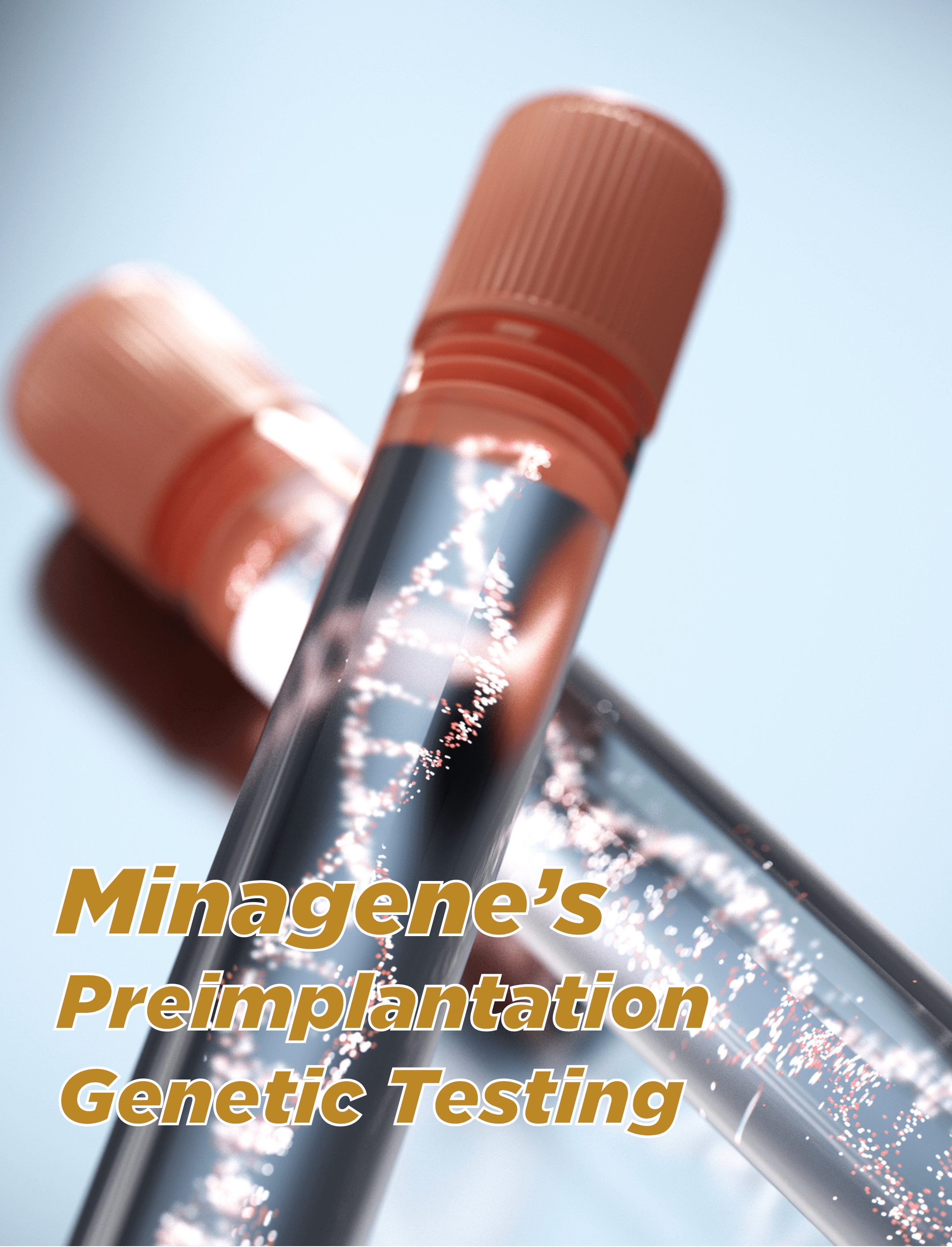
Overview
Minagene's NIPT uses advanced DNA sequencing technology to screen
for common fetal aneuploidies from a simple maternal blood draw.
By analyzing cell-free DNA from the placenta in maternal plasma,
it can detect the additional or missing chromosomes that cause
conditions like Down syndrome, Edwards syndrome,
and Patau syndrome.

Methodology
Cell-free DNA (cfDNA)
Cell-free DNA (cfDNA), derived from both the fetus and the mother,can
be detected in maternal blood and is a valuable resource for physicians.
On average, approximately 10% of the cfDNA present in maternal blood
originates from the fetus. Next Generation Sequencing (NGS), a highly
sensitive technique utilizing millions of sequence reads per sample,
enables the identification and quantification of aneuploidies within this
complex mixture. By analyzing quantitative disparities in cfDNA within
maternal blood, physicians can differentiate between fetuses affected by
trisomy 21 (and other fetal aneuploidies) and those that are unaffected.
Minagene’s NIPT introduces a whole-genome sequencing (WGS) approach
to non-invasive prenatal testing (NIPT). Through sequencing the complete
fetal genome, this method offers physicians a comprehensive assessment
of the chromosomes. Leveraging an advanced counting technique and
state-of-the-art algorithms, Claria NIPT enables the determination of
aneuploidy risk by comparing the ratio of chromosomes of interest to
multiple reference chromosomes. With this cutting-edge technology,
physicians can enhance their ability to provide accurate and reliable
diagnostic information to expectant parents.
Key Highlights of
Minagene’s NIPT
1. Comprehensive Fetal Genome Analysis:
Unlike tests that focus only on specific trisomies, Minagene’s NIPT
screens the entire fetal genome* for a more comprehensive evaluation.
2. Exceptional Test Performance:
Achieves sensitivity and specificity of over 99.9% for Trisomy 18 ,21, and 13.
Maintains a call rate of over 99%,ensuring reliable and informative
results.
3. Minimal Test Failure Rates:
Compared to targeted approaches,Minagene’s NIPT, based on
whole-genome sequencing (WGS),demonstrates significantly lower test
failure rates.
WGS assays provide extensive datacoverage across the entire diploid
genome, reducing assay- and sample-specific biases through
analytical referencing.
This normalization process enhances sensitivity, enabling accurate
aneuploidy detection even in cases with low fetal fraction, which are
typically rejected in targeted approaches due to quality control
concerns.

NIPT
Overview
Minagene’s NIPT uses advanced DNA sequencing technology to screen for common fetal aneuploidies from a simple maternal blood draw. By analyzing cell-free DNA from the placenta in maternal plasma, it can detect the additional or missing chromosomes that cause conditions like Down syndrome, Edwards syndrome, and Patau syndrome.
Methodology
Cell-free DNA (cfDNA), derived from both the fetus and the mother,can be detected in maternal blood and is a valuable resource for physicians. On average, approximately 10% of the cfDNA present in maternal blood originates from the fetus. Next Generation Sequencing (NGS), a highly sensitive technique utilizing millions of sequence reads per sample, enables the identification and quantification of aneuploidies within this complex mixture. By analyzing quantitative disparities in cfDNA within maternal blood, physicians can differentiate between fetuses affected by trisomy 21 (and other fetal aneuploidies) and those that are unaffected. Minagene’s NIPT introduces a whole-genome sequencing (WGS) approach to non-invasive prenatal testing (NIPT). Through sequencing the complete fetal genome, this method offers physicians a comprehensive assessment of the chromosomes. Leveraging an advanced counting technique and state-of-the-art algorithms, Claria NIPT enables the determination of aneuploidy risk by comparing the ratio of chromosomes of interest to multiple reference chromosomes. With this cutting-edge technology, physicians can enhance their ability to provide accurate and reliable diagnostic information to expectant parents.
Key Highlights of Minagene’s NIPT
Comprehensive fetal genome analysis:Unlike tests that focus only on specific trisomies, Minagene’s NIPT screens the entire fetal genome* for a more comprehensive evaluation.
Exceptional test performance:
Achieves sensitivity and specificity of over 99.9% for Trisomy 18 ,21, and 13. Maintains a call rate of over 99%,ensuring reliable and informative results.
Minimal test failure rates:
Compared to targeted approaches,Minagene’s NIPT, based on whole-genome sequencing (WGS),demonstrates significantly lower test failure rates. WGS assays provide extensive datacoverage across the entire diploid genome, reducing assay- and sample specific biases through analytical referencing. This normalization process enhances sensitivity, enabling accurate aneuploidy detection even in cases with low fetal fraction, which are typically rejected in targeted approaches due to quality control concerns.
Diseases
Down Syndrome
Edwards syndrome
Patau syndrome
Turner syndrome
Cri-du-chat syndrome
Klinefelter Syndrome








